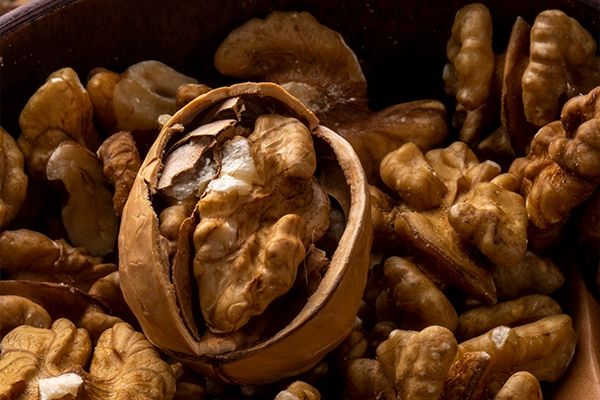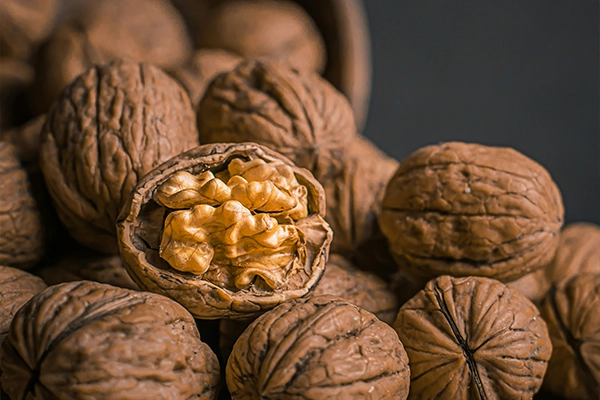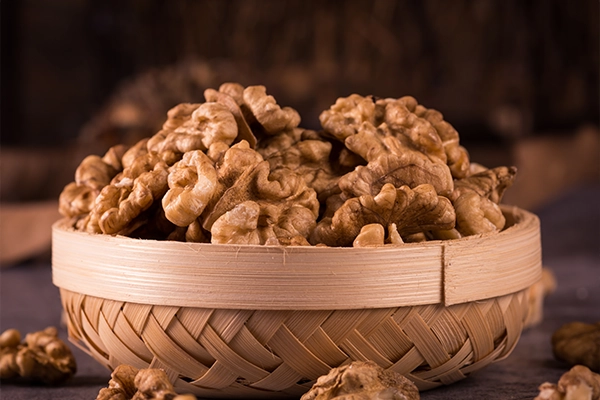As one of the most nutritious types of nuts, walnuts have a special place in healthy diets. Below, you will learn 10 Important Facts About the Value of Walnuts Nutrition, knowing which can change your view of this popular oilseed.

1. Rich source of omega-3 fatty acids
One of the most prominent features related to value of walnuts nutrition is the presence of a significant amount of omega-3 fatty acid ALA. This fatty acid helps maintain heart health and reduce inflammation.
2. Walnuts calories are high in but healthy
Although walnuts calories are relatively high in compared to other nuts (about 654 calories per 100 grams), most of these calories come from healthy, energy-giving fats.
3. High-quality plant protein
Walnuts contain a decent amount of plant-based protein (about 15 grams per 100 grams) and are a good source for people looking to increase their protein intake on plant-based diets.
4. Rich in powerful antioxidants
Part of the walnuts nutrition in formation is related to the presence of antioxidants such as polyphenols, which help fight free radicals and reduce the risk of chronic diseases.
5. Excellent source of dietary fiber
Walnuts are high in fiber and can be beneficial for regulating blood sugar, improving digestion, and controlling weight. This plays an important role among walnut nutrition information.
6. Rich in vitamins and minerals
Walnuts contain vitamin E, B vitamins, magnesium, phosphorus, copper and manganese, all of which help strengthen the immune system and improve body function.
7. Helps with brain health
The vitamins, beneficial fats and antioxidants in walnuts help strengthen brain function and improve memory. For this reason, they have been nicknamed “brain food”.
8. Reduces bad blood cholesterol
Studies have shown that regular consumption of walnuts can reduce LDL (bad cholesterol) and increase HDL (good cholesterol), which plays a key role in the value of walnuts nutrition.
9. Suitable for appetite control
The combination of fiber, protein and healthy fats in walnuts can create a feeling of fullness for a longer time and prevent overeating.
10. Can be used in a variety of diets
Walnuts are a flexible food and can be included in a variety of vegetarian, keto, Mediterranean and even weight control diets.

Nutritional information table for walnuts:
Walnut Nutrition Facts Table (per 100g)
Nutrient Amount (per 100g walnut)
Calories 654kcal
Total Fat 65.2g
Saturated Fat 6.1g
Unsaturated Fat (Omega-3) 9.1g (ALA)
Protein 15.2g
Carbohydrates 13.7g
Dietary Fiber 6.7g
Natural Sugars 2.6g
Calcium 98mg
Magnesium 158mg
Phosphorus 346mg
Potassium 441mg
Vitamin B6 0.537mg
🔹 Walnuts calories in different serving sizes:
| Approximate | calorie intake |
| 1 walnut about | 26 calories |
| 1 tablespoon about | 50 calories |
| 1 handful (30 grams) | about 196 calories |
| 100 grams | 654 calories |
What are the characteristics of a quality walnut?
To get the most out of walnuts nutrition value, it is very important to use fresh, healthy, and quality walnuts. High-quality walnuts not only have a pleasant taste, but also retain the highest level of nutrients.
✅ Characteristics of quality walnuts:
1. Thin and healthy skin: Fresh walnuts have thin, uncracked skins and are free of black spots or mold.
2. Light color of walnut kernels: Walnut kernels should be cream or light yellow; dark color is usually a sign of aging or oxidation, which negatively affects walnut nutritional information.
3. Crisp and non-greasy texture: Quality walnuts should have a dry, crispy texture and no lingering or pungent odor. Walnuts that have lost their fat have lost their fat and may have gone bad.
4. Natural taste and no bitterness: A bitter or sour taste may be a sign of oxidation or spoilage and reduce the walnuts nutrition value.
5. Proper weight to size: Fresh walnuts are heavier than their volume, which means they still retain their natural moisture and fat.
6. Proper packaging: If you buy walnuts packaged, be sure to pay attention to the production date, type of packaging (vacuum or sealed), and storage conditions; because these factors directly affect the walnuts nutrition in formation.
> 📌 Note: If fresh walnuts are stored properly (in the refrigerator or freezer), they can maintain the properties and walnuts calories for a long time without changing.
walnuts Nutrition in formation and their role in foods
Walnuts are one of the few foods that are both delicious and full of nutritional benefits. A look at walnuts nutrition value shows that this nut is more than just a simple snack. In this section, we will point out the most important nutritional facts and see how it can be used in various dishes.
🔍 walnuts Nutrition in formation that you should know:
1. Source of plant-based omega-3: Walnuts are one of the richest sources of ALA (a type of omega-3 fatty acid) among nuts, which is vital for heart and brain health.
2. Plant-based protein: Every 100 grams of walnuts contains about 15 grams of protein, which is essential for providing energy and building body tissues.
3. High in fiber: Walnuts contain soluble and insoluble fiber, which helps with digestive health.
4. Rich in antioxidants: Walnut polyphenols help strengthen the immune system by reducing oxidative stress.
5. Source of minerals: Magnesium, phosphorus, potassium, and copper in walnuts play an important role in regulating muscle, nerve, and heart function.
6. walnuts Calories: There are about 196 calories in every 30 grams of walnuts (about a handful). These calories come mostly from healthy fats and protein.

🍴 Role of walnuts in foods and daily diet
Due to nutritional information of walnuts and its numerous properties, this valuable seed can be included in a variety of meals and dietary styles:
Breakfast: Chopped walnuts on oatmeal, yogurt, or pancakes provide good energy to start the day.
Salads: Combining walnuts with cheese, vegetables, and dried fruits makes a nutritious and complete salad.
Main dishes: In dishes such as fesanjan, dolma and even vegetable sauces, walnuts create a special flavor and more nutritional value.
Snack: Combining walnuts with dried fruit or dark chocolate is a healthy and satisfying snack.
Desserts: In cakes, pastries or smoothies, walnuts, in addition to their crunchy texture, provide walnuts calories to the body in the form of healthy energy.
Considering walnuts nutrition in formation, using it in various meals is a smart choice to maintain a healthy body. The nutritional value of walnuts has made this ingredient have a special place in both vegetarian diets and busy lifestyles. Although calories are relatively high, its energy comes from beneficial sources such as unsaturated fats, protein and valuable minerals.
✅ Conclusion
Looking at these 10 important facts, we clearly understand that walnuts nutrition value of goes beyond what it seems at first glance. This delicious and nutritious nut is rich in omega-3 fatty acids, antioxidants, plant protein, fiber and valuable minerals that can play an important role in maintaining heart and brain health, weight control and strengthening the immune system.
A careful review of nutritional information of walnuts shows that its regular consumption – even despite walnuts calories, which are considered relatively high – if it is in balance, is not only not harmful but can also help improve vital body functions.
Finally, a correct understanding of walnuts nutrition in formation will help us to more consciously include this natural ingredient in our diet; whether as a snack, in meals or desserts. Walnuts are not just a food, but also a rich source of healthy nutrition and a smart lifestyle.










